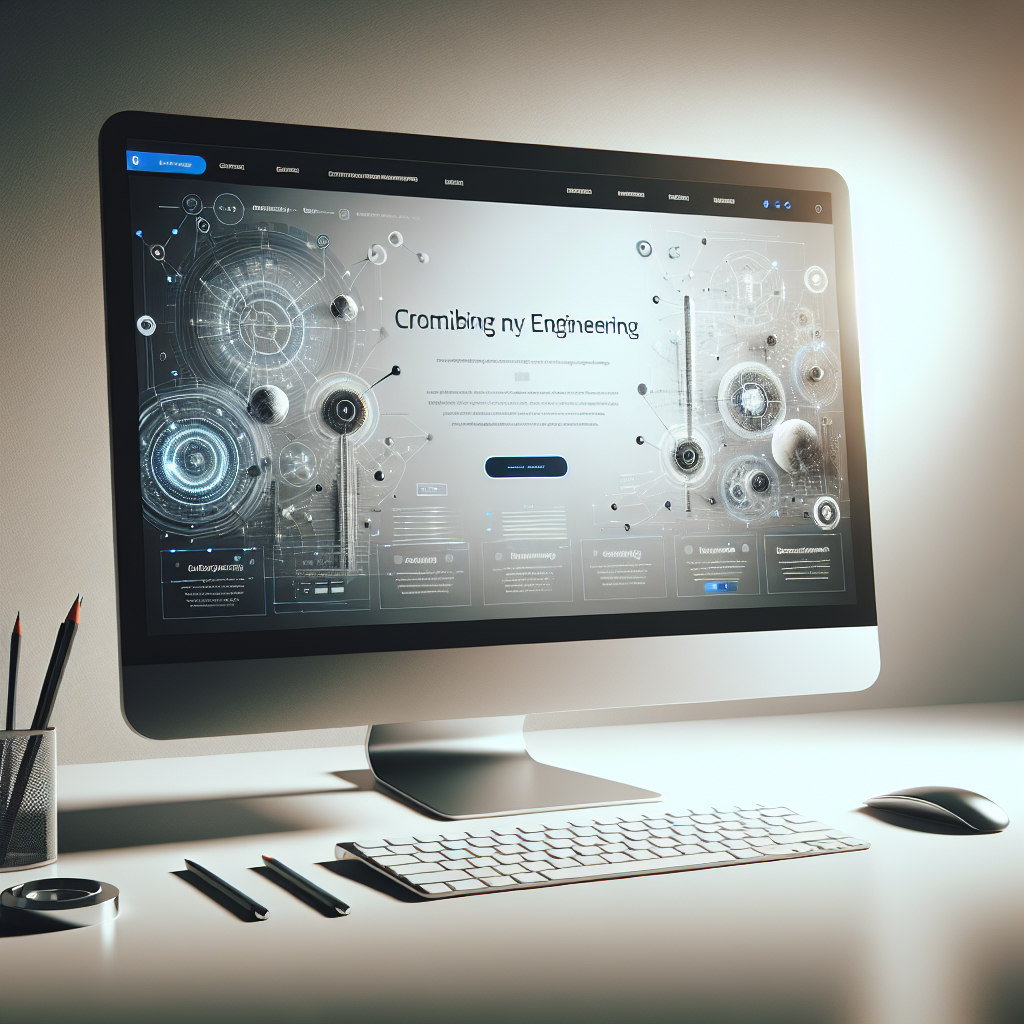In today’s competitive digital landscape, having a visually stunning and user-friendly website is crucial for engineering companies. The right web design can not only attract potential clients but also convey the professionalism and technical prowess of your firm. At Guru Internet Services, we specialize in creating websites that deliver absolute web success for your business, starting with a solid understanding of what makes engineering web design unique.
Engineering companies often deal with complex projects and technical details that need to be communicated clearly and efficiently. A well-designed website should reflect these complexities in a way that is both engaging and easy to navigate. This involves a careful balance between aesthetics and functionality, ensuring that every visitor can find the information they need without getting overwhelmed.
Moreover, the website should serve as a powerful marketing tool that highlights your projects, services, and expertise. This is where innovative web design comes into play, leveraging modern design trends and technologies to make your site stand out. From responsive design to interactive elements, the goal is to create a digital presence that leaves a lasting impression.
If you’re looking to elevate your engineering company’s online presence, you’re in the right place. Our team at Guru Internet Services is dedicated to crafting websites that not only look great but also drive real business success. Get a quote at https://guru-is.com/#contact and take the first step towards revolutionizing your web presence.
Importance of User-Friendly Interfaces

When it comes to the best web design for engineering companies, one of the most critical aspects is a user-friendly interface. A website’s interface is the first point of interaction between the visitor and your business, making its usability paramount. An intuitive and easy-to-navigate interface can significantly enhance the user experience, leading to higher engagement and conversion rates.
A user-friendly interface involves clear and logical navigation menus, easily accessible information, and a design that guides the user through their journey seamlessly. For engineering companies, this means presenting technical data, project details, and services in a manner that is both accessible and comprehensible to a diverse audience. Whether the visitor is a potential client, a partner, or a job seeker, they should be able to find what they are looking for with minimal effort.
Additionally, a well-designed interface can help establish your brand’s credibility and reliability. By using consistent design elements, such as fonts, colors, and icons, you can create a cohesive look that reinforces your company’s identity. This not only makes the website visually appealing but also helps build trust with your audience.
Moreover, optimizing for different devices is crucial. With the increasing use of mobile phones and tablets, ensuring that your website is responsive and functions well on all screen sizes is a must. A responsive design ensures that users have a smooth experience regardless of the device they are using, further enhancing the website’s usability.
In summary, investing in a user-friendly interface is essential for engineering companies looking to make a strong impression online. By prioritizing usability, you can create a website that not only attracts visitors but also converts them into loyal clients.
Responsive Design for Engineering Websites

In today’s digital age, having a website that adapts seamlessly to various devices is non-negotiable. This is where responsive design comes into play. For engineering companies, a responsive website ensures that your site is accessible and functional on all devices, including desktops, tablets, and smartphones.
Responsive design involves using flexible grids, layouts, and images that adjust according to the screen size of the device. This approach not only improves the user experience but also positively impacts your search engine rankings. Search engines like Google prioritize mobile-friendly websites, meaning that a responsive design can help improve your visibility online.
Engineering websites often contain detailed technical information, high-resolution images, and complex graphics. Ensuring that these elements load quickly and display correctly on all devices is essential. Slow load times or poorly displayed content can frustrate users and lead to high bounce rates. By employing responsive design principles, you can ensure that your site provides a consistent and high-quality experience for all users.
Another critical aspect of responsive design is touch-friendly navigation. With more users accessing websites via mobile devices, incorporating touch-friendly elements such as larger buttons, easily tappable links, and swipe gestures can enhance usability. This is particularly important for engineering companies where users may need to access detailed project information or contact details quickly and efficiently.
Moreover, a responsive design simplifies website maintenance. Instead of managing multiple versions of your site for different devices, a single responsive site can adapt to various screen sizes, making updates and changes more straightforward and less time-consuming.
In conclusion, implementing a responsive design is crucial for engineering companies aiming to provide a seamless user experience across all devices. By doing so, you not only enhance user satisfaction but also boost your online presence and credibility.
Optimizing Visual Content for Engineers
For engineering companies, visual content is a powerful tool to communicate complex information effectively. Optimizing visual content not only enhances your website’s attractiveness but also ensures that your images, videos, and infographics load quickly and are accessible to all users.
First and foremost, it’s essential to use high-quality images and videos that are relevant to your field. High-resolution photos of projects, detailed diagrams, and informative videos can greatly enrich the user experience. However, these files often come with large sizes that can slow down your website’s loading speed. Utilizing image compression tools and choosing the right file formats (such as JPEG for photos and PNG for graphics with transparent backgrounds) can significantly reduce file sizes without compromising quality.
Another key aspect of optimizing visual content is ensuring that it is search engine optimized (SEO). This includes using descriptive alt text for images, which helps search engines understand the content of the images and improves your site’s accessibility for visually impaired users. Additionally, incorporating relevant keywords in your image file names and captions can boost your site’s SEO performance.
For videos, using an embedded player from a reliable hosting service like YouTube or Vimeo can help maintain your site’s performance. These platforms offer adaptive streaming, ensuring that videos play smoothly on various devices and internet speeds. Always provide a transcript or a detailed description of the video content to cater to users who may prefer reading over watching.
Infographics are another valuable visual content type for engineering websites. They can simplify complex data and present it in a visually appealing manner. To optimize infographics, ensure they are designed to be easily readable on both large and small screens. Break down information into clear, digestible segments, and use contrasting colors and fonts to highlight key points.
Lastly, don’t forget about the overall visual hierarchy and design consistency across your website. Use a cohesive color scheme, consistent fonts, and well-structured layouts to create a professional and engaging visual experience. By optimizing visual content, engineering companies can effectively convey intricate information, improve user engagement, and enhance their overall web presence.
SEO Strategies for Engineering Companies

In the highly competitive digital landscape, implementing effective SEO strategies is crucial for engineering companies aiming to increase their online visibility and attract potential clients. By optimizing your website for search engines, you can improve your search rankings and drive more targeted traffic to your site.
Firstly, conducting comprehensive keyword research is essential. Identify keywords and phrases that your target audience is likely to use when searching for engineering services. Tools like Google Keyword Planner and SEMrush can help you discover high-volume and relevant keywords. Once identified, incorporate these keywords naturally into your website’s content, meta descriptions, and headers.
Creating high-quality, informative content is another cornerstone of effective SEO. Engineering companies can leverage their expertise by publishing detailed blog posts, whitepapers, case studies, and how-to guides. This not only positions your company as an industry authority but also provides valuable content that can be shared and linked to, boosting your SEO performance. Ensure that your content is well-structured, with clear headings, bullet points, and concise paragraphs to enhance readability.
On-page SEO elements are also critical. Optimize your title tags, meta descriptions, and header tags (H1, H2, H3) with relevant keywords. Use descriptive URLs that reflect the content of the page and include target keywords. Additionally, improving page load speeds, ensuring mobile-friendliness, and creating a user-friendly navigation structure can significantly impact your search engine rankings.
Backlinking is another powerful SEO strategy. Building high-quality backlinks from reputable websites can enhance your domain authority and improve your rankings. Consider reaching out to industry publications, partnering with other businesses, or submitting guest posts to acquire valuable backlinks. Internal linking within your website also helps search engines understand the structure and importance of your content.
Local SEO should not be overlooked, especially for engineering companies that serve specific geographic areas. Claim and optimize your Google My Business listing, ensuring that your business name, address, and phone number (NAP) are consistent across all online platforms. Encourage satisfied clients to leave positive reviews and engage with your audience on local social media channels.
Finally, regularly monitoring your SEO performance and adjusting your strategies based on analytics is key. Use tools like Google Analytics and Google Search Console to track your website’s traffic, user behavior, and keyword rankings. Continuously refining your SEO approach will help you stay ahead of competitors and achieve long-term success.
Case Studies of Successful Engineering Websites

Examining case studies of successful engineering websites offers invaluable insights into what works and why. These examples not only highlight the importance of a well-designed website but also demonstrate the impact of strategic web development and effective SEO practices.
One notable case study is that of ABC Engineering, a mid-sized firm specializing in civil engineering projects. By partnering with a professional web design agency, they transformed their outdated website into a modern, user-friendly platform. The new design featured a clean layout, intuitive navigation, and high-quality visuals showcasing their portfolio. Additionally, they implemented a robust SEO strategy, focusing on local keywords and creating informative blog content. As a result, ABC Engineering saw a 50% increase in organic traffic and a significant uptick in client inquiries within six months.
Another example is XYZ Structural Engineers, who sought to differentiate themselves in a crowded market. Their website redesign emphasized their unique value proposition, with detailed case studies and client testimonials prominently displayed. The site was optimized for mobile devices, ensuring a seamless user experience across all platforms. By integrating advanced analytics tools, XYZ Structural Engineers could track user behavior and make data-driven improvements. This approach led to a 40% improvement in their bounce rate and a 30% increase in lead generation.
DEF Mechanical Solutions also serves as a compelling case study. They focused on enhancing their online presence through a combination of on-page and off-page SEO techniques. Their website featured a comprehensive service overview, an easy-to-navigate project gallery, and a regularly updated blog with industry insights. By obtaining high-quality backlinks from reputable engineering publications and optimizing their Google My Business listing, DEF Mechanical Solutions achieved a 60% boost in search engine rankings and a noticeable rise in local client engagements.
These case studies underscore the importance of investing in professional web design and development services tailored to the unique needs of engineering companies. A well-executed website can serve as a powerful tool for attracting and converting potential clients, ultimately driving business success.
Ready to revolutionize your engineering company’s online presence? Get a quote at https://guru-is.com/#contact and discover how Guru Internet Services can help you achieve absolute web success.


